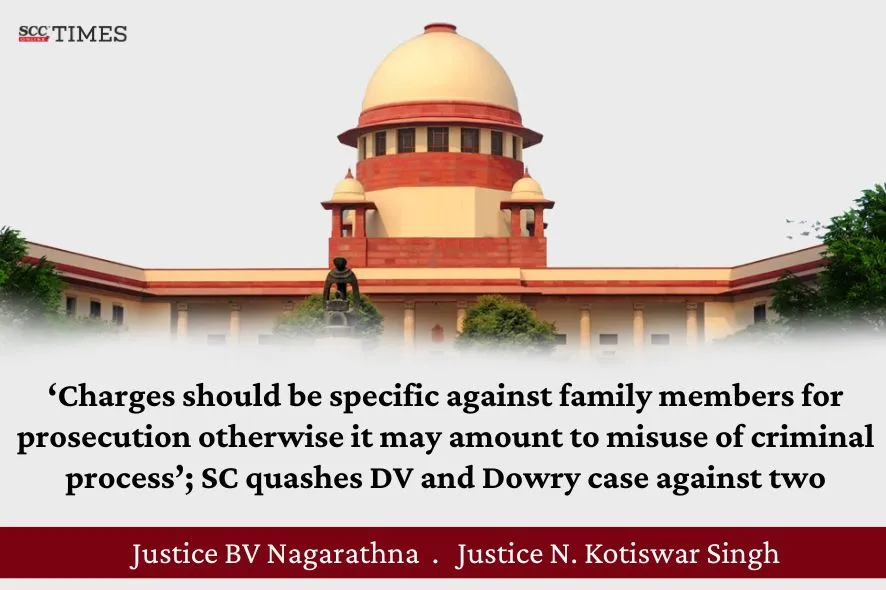Supreme Court: In a set of two criminal appeals against two decisions of the Telangana High Court, whereby the High Court declined to quash the criminal proceedings pending before the Magistrates concerned under Section 498-A, 506 Indian Penal Code (‘IPC’) and Sections 3 and 4 of the Dowry Prohibition Act, 1961 (‘Dowry Act’); and under the Protection of Women from Domestic Violence Act, 2005 (‘DV Act’), the Division Bench of BV Nagarathna and N. Kotiswar Singh*, JJ. allowed the appeals and quashed the criminal proceedings holding that the statements of the witnesses were hearsay evidence and did not disclose any new fact or provide better particulars beyond what was already stated by the complainant. As far as the present appellants are concerned, these witnesses including the complainant merely make generalised allegations without any specific evidence against them.
Factual Matrix
A complaint was filed by the complainant-wife mentioning that her mother-in-law demanded a sum of Rs. 30 Lakhs and accordingly, her mother had given Rs.10 Lakhs by way of cash and 15 tolas of gold as dowry to her mother-in-law. Her husband suspecting her character started harassing her mentally and physically to get additional dowry of Rs.10 Lakhs, for which her mother-in-law, the younger sister of her mother-in-law/ present accused 1, her brother-in-law, and accused 2 pressurized her to act according to her husband’s and mother in law’s wishes and also threatened to kill her if the demand for dowry was not met. It was also alleged that because of their behaviour, the complainant’s mother organised panchayat several times before the elders and other family members.
Another complaint was filed by the complainant alleging cruelty and criminal intimidation under the DV Act, 2005. It was also alleged that her husband had influenced his friends to talk ill of her, who in turn used to call the complainant and ask her to leave her husband, further telling her that her husband had a girlfriend who had taken divorce to marry him. The husband of the complainant also instituted a divorce proceeding alleging neglect, insensitivity to the needs of the husband, incompatibility, concealment of facts, showing hostile attitude towards the husband, refusal to consummate the marriage, causing mental and physical harassment and desertion.
The plea by the accused persons was that in both the proceedings the allegations against them were of a generalized nature devoid of specific offending acts to constitute offences punishable under law.
Analysis and Decision
The Court noted that the chargesheet was filed before the Court of the Magistrate after the investigation was completed by the police based on the complaint/FIR lodged by the complainant and another proceeding was also pending under the DV Act before the Court of the Additional Judicial Magistrate.
The Court stated that a chargesheet is filed only on the culmination of the investigation during which time the investigating agency collects all the relevant evidence in support of the complaint on the basis of which a clear prima facie case indicating the commission of the offence must be made out against the accused warranting trial. Accordingly, the Court examined the chargesheet filed and examined the evidence gathered.
On perusal of the chargesheet, the Court noted that the investigating agency relied on the statements of the complainant, her parents and two other witnesses who are Panchayat elders to substantiate the allegations. On examination of the parents’ statements, the Court pointed out that as far as the demand for dowry of Rs. 30 Lakhs and giving of Rs. 10 lakhs and 15 sovereigns of gold at the time of marriage of the complainant was concerned, it was within the direct knowledge of her parents. However, the other allegations of harassment were informed to them by their daughter but they were not witness to the same. Further, the Court added that the alleged act of beating of the complainant by her husband and other relatives mentioned by the parents was not mentioned by the complainant in her complaints. Therefore, the Court said that this allegation of beating of the complainant was added by the father and the mother of the complainant.
“The statements of the mother and the father of the complainant as annexed in the chargesheet were carbon copies.”
Regarding the evidence of the Panchayat elder, the Court said that the allegation of harassment and the demand of dowry and threat meted out to the complainant of being killed if the demand for dowry of Rs. 5 lakhs were not met, was stated by them after being informed by the father of the complainant. Thus, his evidence was nothing but hearsay evidence.
The Court said that there were specific allegations made against the husband of the complainant, and mother-in-law about the demand of dowry and harassment meted out to the complainant, however, the allegation against the present accused persons was that they along with the other accused family members used to pressurize the complainant to act according to her husband and her mother-in-law’s wishes. The Court stated that apart from this generalised allegation, there were no specific or overt acts attributed to the accused persons which would be tantamount to acts of cruelty or physical or mental harassment or being active participants in the demands for dowry.
Hence, the Court held that the identical statements of the witnesses did not inspire the confidence of the Court for the continuation of the criminal proceedings with regard to the present accused persons.
Regarding the proceedings pending under the DV Act, the Court said that the said second complaint was more or less the reiteration of the allegations made in her first complaint with some additional incidents. The Court also said that there were no specific allegations about harassment made against the accused persons. The Court also pointed out that the allegation of being thrown out of her matrimonial house was specifically made against her husband and she did not attribute any role of the accused persons except for making a general allegation of harassing her physically and mentally without specifying the actual role.
Invoking criminal process is a serious matter with penal consequences involving coercive measures, which can be permitted only when the specific act(s) which constitute offences punishable under the penal code or any other penal statute are alleged or attributed to the accused and a prima facie case is made out. It applies with equal force when criminal laws are invoked in domestic disputes. Criminalising domestic disputes without specific allegations and credible materials to support the same may have disastrous consequences for the institution of family, which is built on the premise of love, affection, cordiality and mutual trust. The institution of family constitutes the core of human society. Domestic relationships, such as those between family members, are guided by deeply ingrained social values and cultural expectations. These relationships are often viewed as sacred, demanding a higher level of respect, commitment, and emotional investment compared to other social or professional associations. For the aforesaid reason, the preservation of family relationships has always been emphasised upon. Thus, when family relationships are sought to be brought within the ambit of criminal proceedings rupturing the family bond, courts should be circumspect and judicious and should allow invocation of the criminal process only when there are specific allegations with supporting materials which clearly constitute criminal offences.
“When tempers run high and relationships turn bitter, there is also a propensity to exaggerate the allegations, which does not necessarily mean that such domestic disputes should be given the colour of criminality.”
The Court observed that domestic violence typically happens within the four walls of the house and not in the public gaze. Therefore, such violence is not noticed by the public at large, except perhaps by the immediate neighbours. Thus, providing visible evidence by the victim of domestic violence may not be easily forthcoming and producing direct evidence may be arduous, which does not necessarily mean that domestic violence did not occur. The Court also stated that the purpose and mandate of the law to protect the victims of domestic violence is of paramount importance, and a balance has to be struck by ensuring that while perpetrators are brought to book, all the family members or relatives are not indiscriminately brought within the criminal net in a sweeping manner.
The Court viewed that in domestic violence cases, the complaints and charges should be specific against each and every member of the family who are accused of such offences and sought to be prosecuted, as otherwise, it may amount to misuse of the stringent criminal process by indiscriminately dragging all the members of the family. The Court explained that there may be situations where some of the family members or relatives may turn a blind eye to the violence or harassment perpetrated to the victim, and may not extend any helping hand to the victim, which does not necessarily mean that they are also perpetrators of domestic violence, unless the circumstances indicate their involvement and instigation.
What needs to be assessed is whether such allegations are genuine with specific criminal role assigned to such members of the family or whether it is merely a spill over and side-effect of a matrimonial discord and allegations made by an emotionally disturbed person. Each and every case of domestic violence will thus depend on the peculiar facts obtaining in each case.
Hence, holding that the evidence of the complainant did not disclose anything against the accused persons, the Court set aside the impugned decisions and quashed the criminal proceedings.
CASE DETAILS
|
Citation: Appellants : Respondents : |
Advocates who appeared in this case For Petitioner(s): For Respondent(s): |
CORAM :










